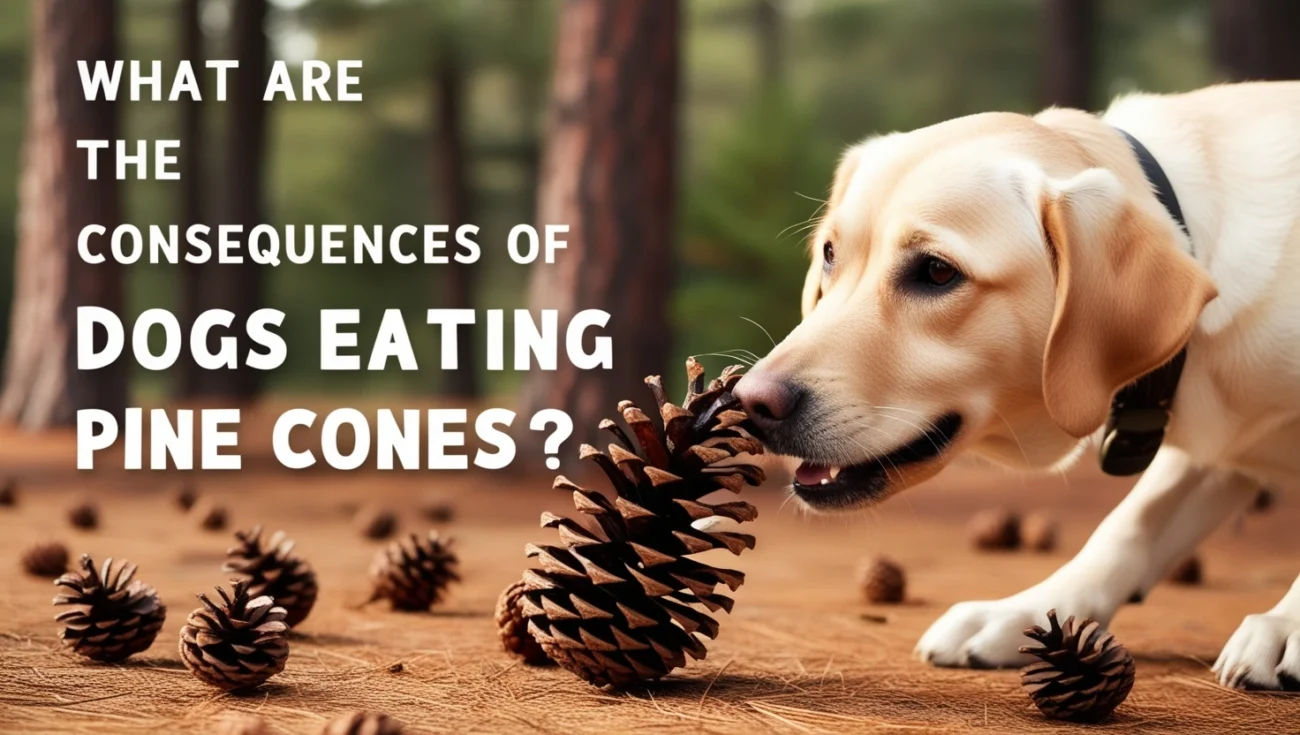Dogs are curious creatures. While this behavior is natural, it sometimes leads to them ingesting things that aren’t safe—like pine cones. Pine cones may look harmless, but for dogs, they can pose several risks. Understanding the consequences of dogs eating pine cones can help you safeguard your furry friend’s health.
Why Do Dogs Eat Pine Cones?
Before delving into the consequences, let’s address why dogs might be tempted to eat pine cones.
- Natural Curiosity: Dogs use their mouths to investigate objects. The texture and unique smell of pine cones might intrigue them.
- Chewing Habit: Many dogs love to chew. Pine cones provide a crunchy, irregular surface that some dogs find satisfying.
- Boredom: A bored dog may start chewing on objects they encounter during a walk or in the yard.
- Nutritional Deficiency: In rare cases, dogs may chew or eat non-food items due to a condition called pica, often linked to nutritional deficiencies or underlying health issues.
The Risks of Dogs Eating Pine Cones
While it may seem harmless for a dog to nibble on a pine cone, there are several dangers associated with this behavior:
1. Choking Hazard
Pine cones are irregularly shaped and can easily become lodged in a dog’s throat, especially for smaller breeds. A lodged pine cone can obstruct airways, leading to choking, which is a life-threatening situation requiring immediate veterinary attention.
2. Gastrointestinal Blockage
Once ingested, the size and rigidity of pine cones make them difficult to pass through the digestive tract. A large piece of pine cone could get stuck in the stomach or intestines, causing a blockage. Symptoms of gastrointestinal obstruction include:
- Vomiting
- Diarrhea or inability to defecate
- Abdominal pain
- Lethargy
- Loss of appetite
3. Toxicity from Resin
Pine cones often contain resin, a sticky substance that is mildly toxic to dogs. Ingesting resin can irritate the mouth, throat, and stomach. In severe cases, it can lead to vomiting, diarrhea, and excessive drooling. Some types of pine trees, such as Norfolk Island Pine, are particularly toxic to dogs.
4. Sharp Edges
The rough, spiky edges of pine cones can cause physical damage to a dog’s mouth, esophagus, or digestive tract. Chewing or swallowing these sharp fragments may result in cuts or tears, leading to internal bleeding or infection.
5. Allergic Reactions
Some dogs may be allergic to pine cones or the substances they carry, such as mold or pollen. An allergic reaction can manifest as:
- Itchy skin or rashes
- Swelling around the face or mouth
- Sneezing or coughing
- Difficulty breathing
Signs That Your Dog May Have Eaten a Pine Cone
It’s not always easy to catch your dog in the act, but there are some telltale signs that they may have eaten a pine cone:
- Persistent coughing or gagging
- Difficulty swallowing
- Vomiting or retching
- Unusual drooling
- Signs of abdominal discomfort (e.g., whining, pacing, or stretching)
What to Do If Dog Eats a Pine Cone
If you suspect your dog has eaten a pine cone, follow these steps:
1. Assess the Situation
Determine whether your dog is showing any immediate signs of distress, such as choking or difficulty breathing. If so, seek emergency veterinary care.
2. Remove Access
If your dog is actively chewing on a pine cone, remove it from their reach and dispose of it properly to prevent further ingestion.
3. Monitor Symptoms
Keep an eye on your dog for any signs of gastrointestinal distress or allergic reactions.
4. Contact Your Veterinarian
If you’re unsure about the severity of the situation, it’s always best to consult your veterinarian.
Preventing Your Dog from Eating Pine Cones
Prevention is always better than cure. Here are some practical tips to stop your dog from munching on pine cones:
1. Supervise Outdoor Activities
When walking or playing with your dog in areas with pine trees, keep a close eye on them.
2. Provide Safe Chewing Alternatives
Offer your dog appropriate chew toys to satisfy their urge to chew. Durable toys made of rubber or nylon are great options.
3. Train Basic Commands
Teaching commands like “leave it” or “drop it” can help you redirect your dog’s attention if they pick up a pine cone.
4. Yard Maintenance
Regularly clean your yard to remove pine cones, needles, and other potential hazards. This is especially important if you have pine trees on your property.
5. Address Boredom
Ensure your dog gets plenty of physical and mental stimulation through regular exercise, interactive toys, and training sessions.
Safe Alternatives for Natural Chewing
If your dog enjoys chewing on natural objects, consider these safe alternatives:
- Bully Sticks: A natural and digestible chew option for dogs.
- Antlers or Hooves: Long-lasting and satisfying, but always supervise to avoid fractures.
- Dental Chews: These not only satisfy chewing needs but also promote oral health.
- Carrot Sticks: A crunchy, healthy snack that many dogs love.
Final Thoughts
While pine cones may seem harmless, they can pose serious health risks to your dog. From choking hazards and gastrointestinal blockages to toxicity and physical injuries, the consequences of dogs eating pine cones are far from trivial. By understanding the dangers and taking preventive measures, you can protect your dog and ensure they stay safe and healthy.




Pingback: What are the Risks of Dog Health supplements side effects?